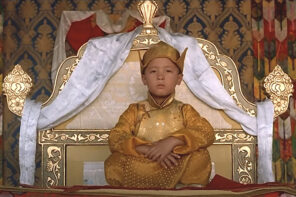Just days after London’s “public relations nightmare” with Olympic Torch bearers relentlessly interrupted by protesters, authorities stood on high alert in San Francisco. The day began as few do in this chilly city: sunny and mild. From the early morning the crowds amassed, spanning miles with clashing signs and views on the Beijing games.
Plenty gathered to support China; mainly Chinese-Americans in white Olympic T-shirts waving crimson Chinese flags of all sizes. Competing for exposure were protesters of varying stripes, opposing everything from Beijing’s relationship with Darfur to Chinese fur-harvesting techniques; a hodgepodge of Tibetans, human rights activists, schoolchildren, hippies on bicycles, office workers, and Buddhist monks.
At 1:00 p.m., with the torchbearers preparing far across town, police attention turned toward the corner of the plaza where the Torch route was to end. Chinese performers sang Olympic pop promos and protesters waved signs reading “Free Tibet” and “Free Speech Now.” One man shouted, “Protect the First Amendment! This isn’t Communist China!” Police and park rangers tried convincing the protesters to leave the plaza and join the pro-Tibet contingent out in the street, but the protesters would not budge.
Along the waterfront, the local chapter of Students for a Free Tibet drew huge crowds with their Chinese tank fashioned from plywood and cardboard. Three students clad in green Chinese military uniforms manned the tank on all sides, batons in hand, ready to strike two students seated in the vehicle’s path. Their victims, dressed as handcuffed Tibetan Buddhist monks, were covered in fake blood and held a poster-sized photo of the Dalai Lama.
A few feet away, a redheaded man dressed as a soldier chased another faux monk. As the red-robed monk fell to the ground, the “soldier” waved a small Chinese flag and “whipped” the monk with a black rubber tube. Protesters ate it up while the nearby crowd of China supporters chanted “Go back to Hollywood!” and “Who’s paying you?” in nearly perfect syncopation with the baton blows.
“We don’t believe that an Olympics in 2008 can be anything but a political event,” said William Hibbits, the monk. “Last week I said, ‘I’ll dress up like a Chinese soldier! And you can dress up like a Tibetan!’” enthused Hibbits’ friend, before pulling out the green Mao hat that had been snatched from his head and shredded by China supporters. When he was attacked, Hibbits said, he stood by silently with his hands clasped in front of him: “The non-action of me being dressed this way incites them to violence.”
Watching the streetscape from the base of a towering palm tree was a group of actual Tibetan Buddhist monks from San Jose. “The Dalai Lama always says don’t be violent,” said monk Sangyal Dhondub through a Tibetan interpreter. But those protesting Chinese treatment of Tibetans must not be judged too harshly, he continued, even if they disrupt Olympic activities: “As human beings, they cannot control their emotions.”
“I’m in support of protest happening here, so people know that Tibetans still exist,” said his translator, Losang Tsarang. “We don’t have such power, but we have truth to support us. There are not so many Tibetan people in the world, but still they [China] have to run and hide from us. They say Olympics stand [for] peace and friendship. The Chinese government won’t meet the needs of the Olympic games.”
About an hour after the opening ceremony rumors circulated that the Torch might not be coming to San Francisco after all. By the time the news finally came in, the city had already secreted the Torch down an unpublicized alternate route to avoid the protests completely, closing with a ceremony at the airport before the Torch continued on its “Journey of Harmony.”
Unhappy throngs quickly took over nearby restaurants and benches. “The Olympics is a world event. It’s not political,” said Chinese-American Ging Wang. “The people supporting Tibet were mostly Westerners,” said Carrie Zheng, a college student in her first year away from China. “The first thing is, Tibet is, was and always will be a part of China. We don’t have restrictions on religion in Tibet. We will never, ever deny their religion.”
For Tibetan Buddhist Tseten Dorjee, who flew from Oregon to protest, the debate is nuanced. “A lot of [Chinese] have sympathy with what’s happening in Tibet,” she said, even if they are afraid to say so. “They also stand for the Olympics in Beijing, which I understand; they feel very proud. We are only humans—they’re human, and we’re human—and we’ll have a little round-about about what is true.”
As the sun began to set, hundreds of Tibetans gathered for prayers and speeches in a sea of traditional dress and the yellow of Tibetan flags. Majora Carter, one of two American torchbearers to flash a Tibetan flag with the Torch drew loud applause with her promise: “The spirit that was in it is going to China!”
For some, the day’s events were satisfying. “We wanted to chase them away,” said Thuptan Donyo, leader of a San Jose Tibetan Buddhist center, referring to the Chinese Olympic authorities. “They say this has nothing to do with politics. Go back to China.”




